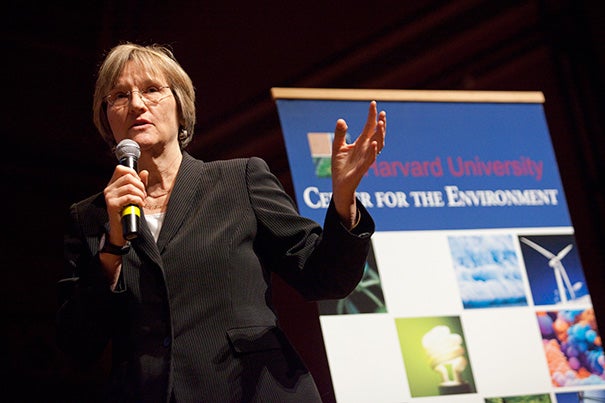
President Drew Faust today challenged University alumni and friends to contribute toward a $20 million Climate Change Solutions Fund. “Harvard has a vital leadership role to play in this work. As a university, it has a special obligation and accountability to the future, to the long view needed to anticipate and alter the trajectory and impact of climate change,” she said.
File photo by Jon Chase/Harvard Staff Photographer
Fund to tackle climate change
Faust issues challenge to help find environmental solutions
In an effort to catalyze research with potential to accelerate the progression from nonrenewable to renewable sources of energy, Harvard President Drew Faust today challenged University alumni and friends to contribute toward a $20 million Climate Change Solutions Fund that will seed new approaches to confronting the threats posed by climate change.
The Climate Change Solutions Fund will be part of the Harvard Campaign’s broader ongoing efforts to raise funds for energy and environment research, which have already generated nearly $120 million in support.
Faust said that she will make available $1 million at the start of the 2014-15 academic year to launch the fund, which will invite grant proposals from faculty and students across Harvard with innovative ideas for projects with promise to enable the transition from carbon-based to renewable fuels.
In a letter to the Harvard community that also touched on progress made toward meeting environmental sustainability goals on campus and Harvard’s commitment to sustainable investing, Faust noted that universities have produced much of the research upon which the scientific consensus on the threat of climate change is based.
“Ideas, innovation, discovery, and rigorous independent thought will serve as indispensable elements in combating the climate threat; these are the special province of universities,” she said.
“Harvard has a vital leadership role to play in this work. As a university, it has a special obligation and accountability to the future, to the long view needed to anticipate and alter the trajectory and impact of climate change,” she said. “Already we support research at the vanguard of energy and climate science.”
Faust’s letter followed an October 2013 message to the community in which she outlined ways in which the University could most effectively address climate change, with special focus on research, on-campus sustainability initiatives, and sustainable investment practices. In today’s letter, she released a report showing that the University had made substantial progress toward its goal of cutting greenhouse gas emissions by 30 percent by the year 2016, and she highlighted Harvard’s decision to sign on with the United Nations Principles of Responsible Investing.
Across the University, more than 250 courses are offered that focus on aspects of environmental sustainability, and more than 225 faculty are affiliated with the Harvard University Center for the Environment. Recognizing the power of Harvard to convene experts from across a variety of disciplines, Faust said she aims to “catalyze” aspects of research on campus “specifically focused on shaping and accelerating the transition to a sustainable energy system.”
“I challenge our talented and dedicated faculty and students to identify how their efforts can propel societies and individuals along this path. And I challenge our alumni and friends to assist me in raising $20 million for a fund that will seed and spur innovative approaches to confronting climate change, as an element of our broader campaign efforts in energy and environment,” she said.
The fund will be administered by the Office of the Vice Provost for Research. Vice Provost for Research Richard D. McCullough will be advised by a committee that will review applications from Harvard faculty members and students, and he will make recommendations on final grantees to Faust. Proposals will be ranked based on an evaluation of intellectual merit, interdisciplinary collaboration, innovation, and potential impact on the fields of energy and the environment.
The faculty experts on the committee will be asked to look for research projects that demonstrate a clear pathway to application as well as riskier projects with the potential to be transformative over time.
“Our research across Harvard — in climate science, engineering, law, public health, policy, design, and business — has an unparalleled capacity to accelerate the progression from nonrenewable to renewable sources of energy,” Faust said.




